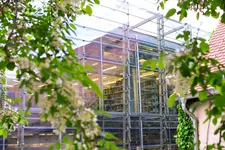Programme Profile
Key areas of German Language
Modern German Literature
Topics: Literature in German from the 16th century to the present, studied in the context of European and non-European literatures and other media; literary historiography; historical interpretation; theoretical and methodological issues. Advanced reading comprehension from the perspective of history, literary theory and cultural theory; methodologically founded textual analysis and interpretation.
Medieval German Literature
Topics: Literature in German from its beginnings up until the early modern period. Analysis and interpretation of a wide range of texts, including chivalric romance, heroic poetry, Minnesang, Sangspruchdichtung, and moral and didactic poetrywithin the contextof their cultural background and on the basis of current theoretical debates and their reception up until the present day.
German Linguistics
Topics: The German language from the beginning of its recording in the Middle Ages to the present. Aspects of analysis: various components of the language, such as texts, sentences, words and sounds; the meaning of words and their dictionary description; regional and class-specific language varieties; language contacts; language acquisition; oral and written manifestations; action through language; German as a foreign language.
Additional Sub-disciplines in this Degree Programme
In the module ‘Literature and Mediation’, you can choose between two specialisation options:
Didactics of German Language and Literature
Didactics is the basis for teaching rhetorical, literary and media competences successfully outside of a school context.
Impartation/Mediation of Literature
As a specialisation, impartation/mediation of literature gives you insights into the fields of literary criticism, cultural management, theatre, publishing, press relations, and developments in the book market and the world of literature.
Programme Objectives
Students of German Language and Literature:
- acquire fundamental systematic and historical knowledge in German linguistics, literary studies and cultural studies.
- learn to present aspects of their discipline by example and apply the skills they have acquired to new topics and questions;
- gain the ability to methodologically reflect on language, grammar, communication and language-based media;
- learn to conduct research, evaluate sources and information, and structure and present knowledge;
- become qualified to teach the German language competently and confidently (teacher education students);
- acquire skills in the practical field of ‘Literature and Mediation’ (bachelor's degree students).
(Copyright-Hinweise: Foto 1. Spalte: © Colourbox; Foto 2. Spalte: © Universität Bamberg; Foto 3. Spalte: © Reinhardt-Fotografie; Foto 4. Spalte: © Jenny Maria Wehrl/Universität Bamberg;)



